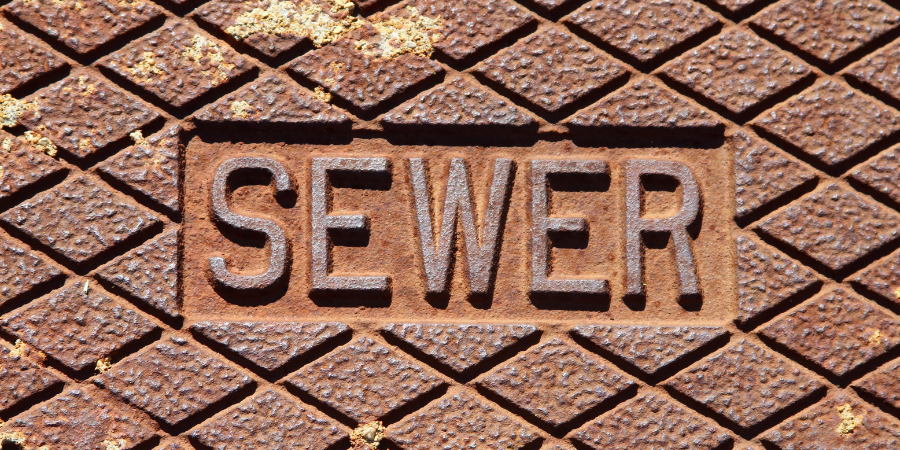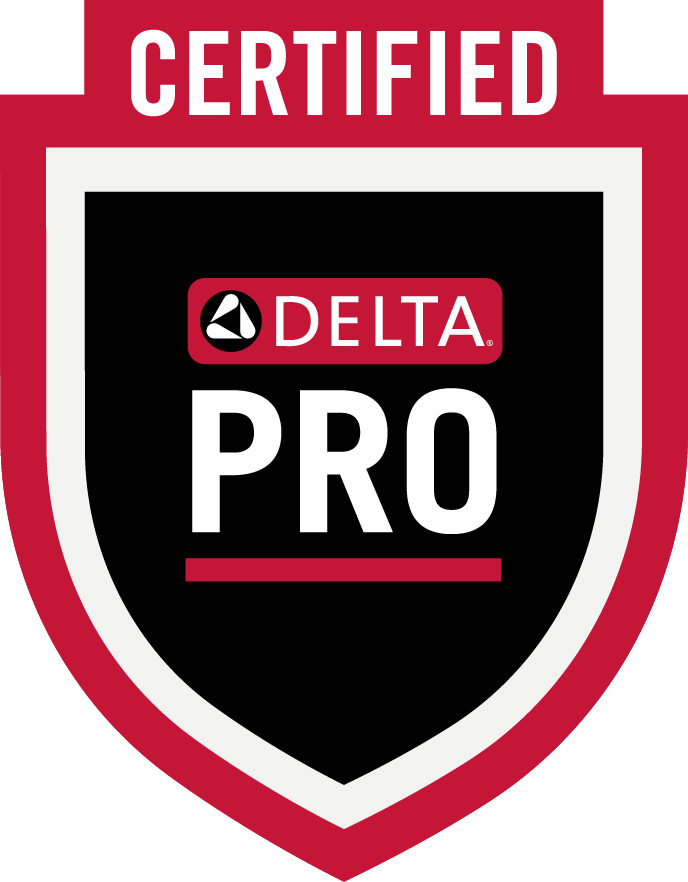Many problems can develop in a plumbing system, such as flooding from a burst washing machine hose, losing hot water from a sediment-filled storage tank, or a leaking pipe that leaves unsightly stains on your ceiling. Still, one plumbing disaster beats them all: a sewer line backup.
In this article, we will discuss what a sewer line is and how it is intended to operate. We will look at the early signs indicating a sewer line may malfunction and the causes of a sewer line backup. We will then explain why sewage is dangerous to your health and your home and ways you can contribute to preventing a backup.
What Is A Sewer Line?
The sewer line is a plumbing pipe that transports wastewater, also known as sewage, from the drains in a home. These drains may be attached to toilets, sinks, and showers or run from dishwashers and washing machines.
As the toilet is flushed or the faucet runs, the wastewater travels through the sewer line and into a private septic tank or a public sewer system maintained by your municipality. Septic tanks are located outside in close proximity to the house. In the case of public sewers, the home line typically crosses the front yard and connects to a 3-5 foot pipe under the street.
How A Sewer Line Works
A well-working sewer line removes foul-smelling waste that contains harmful bacteria, viruses, and chemical compounds that can harm the environment. It operates primarily on the power of gravity, which pulls wastewater down and out of drains and moves it through a system of pipes before it arrives at a wastewater treatment plant.
In cases where homes sit lower than the treatment facilities, gravity must be assisted by additional methods. Grinder pumps are used to pulverize solid waste so it can be lifted along with dirty water to higher elevations where gravity can do its job again. Sewer lift stations are installed to promote this process.
Why Sewer Lines Backup
Because sewer lines run underground, they are susceptible to soil shifts, tree root invasion, and chemical reactions between pipe materials and the surrounding soil. Additionally, because they carry wastewater, there is an increased risk of clogging from accumulating debris. Here, we will look at common signs of a sewer line issue.
Signs Of Trouble
Knowing the early signs of a sewage backup allows you to address issues so that prompt repairs can contain damages.
Foul Odors
A sewer line is full of waste, and toilet waste, especially, carries a terrible smell easily recognizable by nearly everyone. If you smell sewage inside or out, look for a sewer line problem. Cracked lines or pipes that have separated from shifting soil allow sewage to escape.
Slow Drains
Every drain in a home empties into the sewer line. If the line becomes blocked by too much grease or nearby tree roots, the wastewater has difficulty flowing freely. This causes drains to empty slower and eventually stop draining if the blockage is severe enough.
Gurgling Sounds
A blocked drain interferes with the airflow required to keep drains flowing freely. When the air is restricted, a kind of vacuum develops, causing strange noises to emanate from plumbing pipes. Gurgling is one common sound they make.
Wet Spots
A sewer line that has been compromised will allow sewage to seep into the nearby soil. As it is absorbed, the soil can only hold so much, resulting in pools of raw sewage in the yard. You will probably smell pooling sewage before you see it.
Causes Of A Backup
There are several reasons why sewer lines fail, resulting in sewage reversing direction and spewing wastewater into tub and sink drains. Here, we will look at five common causes.
Clogs
Improper waste disposal is mainly the reason sewer lines clog. Flushing diapers, feminine hygiene products, and products falsely labeled as flushable are typical culprits.
In the kitchen, grease and oils are thoughtlessly dumped down the drain where they congeal and cling to pipe interiors. As food bits pass by, they stick to the grease, causing clogs that can block a sewer line.
Learning and practicing good disposal habits will significantly reduce sewer clogs. Be sure to educate others who will be using your plumbing, such as family members and guests.
Tree Roots
Trees planted near sewer lines can cause major issues as they are attached to the smallest amount of sewage leakage. Once a root enters the sewer line, it will not be long before the entire pipe is clogged with roots, blocking wastewater exiting and forcing a backup.
Heavy Rains
When heavy rains dump excess water into the municipal sewer system, it can overpower it, leaving no room for the wastewater to go. If heavy rains are expected in your area, be mindful of water use and reduce the amount of wastewater in your drains until the storm has passed.
Old Pipes
Old plumbing lines have had plenty of wear and tear. Loose joints, sagging pipes, and a collection of dirt and debris will leave your sewer line susceptible to the many causes of a backup.
Pipe materials from years ago, such as those made of clay or cast iron, are deteriorating. Replacing your line is recommended if your sewer pipes have seen better days.
Municipal Issues
Sometimes, the issue is beyond your control, such as when the municipal line becomes blocked. If you notice early signs of sewer line issues, it is always a good idea to let your municipality know so they can check to see if they are responsible for the problem.
Why Sewage Backups Are Dangerous
Raw Sewage contains bacteria, viruses, and impurities that can negatively affect your health, home, and the environment. Here, we will take a closer look at how this occurs.
Health
When an inside drain backs up, it is important to call for professional help since they know the safety steps to follow. Always avoid direct contact with sewage or even with inhaling the fumes. Prolonged contact can lead to Hepatitis A, Gastroenteritis, and E.Coli. Never risk your health to clean up an area affected by sewage remnants.
Mold
When a sewer line backs up, any weak areas in the plumbing system can be affected. Loose pipe joints will leak sewage, which nearby building materials absorb. The dark conditions, aided by excess moisture, create the ideal conditions for mold growth, leading to respiratory and other health issues.
Property Damage
As mentioned, when building materials such as floor joists, drywall, and insulation absorb the sewage, it can cause them to deteriorate. If left undetected, these conditions can worsen so quickly a home may need to be abandoned until repairs can be made.
Environmental Issues
Outdoors, a leaking sewer line can allow untreated sewage to pollute rivers and lakes. This not only increases the need for more costly and effective wastewater treatment but also puts the wildlife that depends on their fresh water at risk
The environmental effects of sewage being released into the soil can last for many months. Although not the only contributor to land pollution, leaking sewage must be considered a source.
Steps To Prevent A Backup
Responding to a sewer line backup is a job for a professional plumber and should never be considered a DIY project. Homeowners can be helpful, however, in preventing sewer issues by engaging in the following practices.
Poor Disposal Habits
Homeowners carry a responsibility for preventing sewage backups. They must educate themselves and strictly follow disposal habits to keep unwanted items out of the plumbing pipes. Preventing an accumulation of food particles and grease and keeping everything except human waste and toilet paper out of the toilet will help improve the sewer line’s health.
Inspection And Cleaning
Enrolling in preventative cleaning and professional inspections will also help to prevent sewer line issues. Inspections are completed using a waterproof video camera inserted into the line. Early detection of problems is the main goal of a sewer line inspection.
Are You Looking For Maintenance And Repair Of Your Sewer Line?
We offer sewer line repair and maintenance services to assist you in keeping your sewer line in good working order. By looking for the early signs of a sewer line malfunction, homeowners can alert us of possible sewer line problems.
Our expertise and experience allow us to quickly determine the cause of your issue, whether related to corrosion, invading tree roots, or any other conditions leading to sewer line failure. Remember, sewage should never be addressed by anyone other than a professional since it can be toxic to humans and the environment and lead to structural issues that will be costly to repair.
Call us if you suspect a sewer line issue or if a minor problem has already become a serious sewer line disaster. We are available 24/7 for all of your sewer line needs! Call us today!






